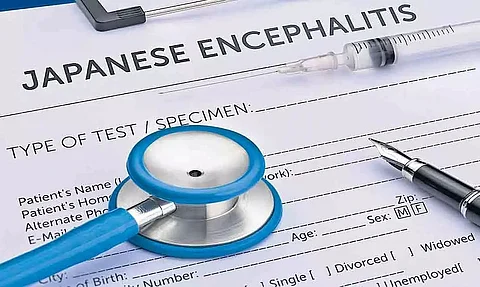
- Home
- Live Blog
- Breaking News
- Top Headlines
- Cities
- NE News
- Sentinel Media
- Sports
- Education
- Jobs

With flood waters receding and people returning to their houses from relief camps, JE (Japanese Encephalitis) and AES (Acute Encephalitis Syndrome) broke out. Till July 6, heath workers detected 143 AES cases, claiming 16 lives. They have also detected 48 JE cases. State NHM Mission Director Dr MS Lakshmi Priya held a video conference with the officials of the State IDSP cell (Integrated Disease Surveillance Programme) and State NVBDCP cell (National Vector Borne Disease Control Programme). What is Japanese encephalitis? Japanese encephalitis (JE) is a viral brain infection spread by mosquitoes. Mosquitoes carry it from infected animals, typically spreading it among humans in rural areas across Asia. The disease is caused by a flavivirus that affects the membranes around the human brain and leads to inflammation of the brain due to infection. Where does Japanese encephalitis occur? Japanese encephalitis is the leading cause of viral encephalitis in Asia, spreading across the entirety of the continent. The mosquito that carries the disease thrives and breeds in the agricultural areas of Southeast Asia, the Far East and the Pacific Islands. Half of the 70,000 cases that are witnessed each year originate in China, where mosquitoes breed in stagnant water pools and flooded rice fields. The first case of Japanese encephalitis in India was reported in 1955, and has recently been most common in the states of Tamil Nadu, Karnataka and Kerala. That said, outbreaks have been reported across the country, in 15 states and union territories. What are some common Japanese encephalitis symptoms? Most cases of Japanese encephalitis are asymptomatic, with patients unlikely to develop symptoms. Moreover, patients who do get symptoms will find them to be mild, only getting headaches and a high fever. However, 1 in 200 cases are more severe, with symptoms including loss of consciousness and convulsions. In rare cases, the disease can cause permanent brain damage or even death. Some common signs and symptoms of Japanese encephalitis include: High fever Headache Nausea Diarrhoea Muscle pain Neck stiffness In rare, severe cases, initial symptoms can last for a few days, and then worsen into more serious symptoms, including: Disorientation Seizures Coma Spastic paralysis Uncontrollable shaking Death Symptoms of Japanese encephalitis in children Unfortunately, Japanese encephalitis tends to affect children between 1-15 years more than any other demographic, possibly due to a lack of immunity built up over the years. Symptoms of Japanese encephalitis in children can be more severe than in adults, with an estimated 25% of affected children dying from the disease. Among those who survive, about 30-40% are left with physical and/or mental impairments. What causes Japanese encephalitis? The virus is mostly found in animals such as pigs and wading birds, typical in rural areas of the country. The carrier mosquito bites the host, contracts the virus and passes it on to humans with its next bite. Humans are the final destination when it comes to JE – with neither the infected human nor other mosquitoes able to pass the virus on to others. How to prevent Japanese encephalitis at home Unlike other mosquito-borne viruses, there is a vaccine available for Japanese encephalitis. It is produced in limited quantities locally at the Central Research Institute in Kasauli, but the vaccine is available nationwide. If you live in a virus-prone area, the vaccination will be an important preventative measure. You will receive three doses of the vaccine which should prevent JE for a number of years. One should also take some additional measures for added protection as Home Remedy: > Refrain from going outdoors at dusk or dawn when the mosquitoes carrying the Japanese encephalitis are most active > Use mosquito repellent products and sleep inside an insecticide-treated or plain mosquito net > Stay within rooms with window screens. > Wear loose, light-coloured clothing that entirely covers your skin. You may also want to take steps to help repel mosquitoes where you live. A product like the Insta Vapourizer can work in the background to kill mosquitoes within five minutes of being activated. How to use Insta Vapourizer? To use, simply remove the cap and insert the liquid vaporiser bottle into the electric heating machine. Plug it into an outlet and switch on the heater, keeping doors and windows closed for the first 30 minutes for best results. How is Japanese encephalitis treated? If you begin to develop Japanese encephalitis symptoms, a trip to the hospital may be in order. Your doctor will likely take blood tests and scans of the brain, and may also do a lumbar puncture (or spinal tap) to check for antibodies in your spinal fluid. There is currently no cure for Japanese encephalitis, but you will receive supportive treatment in hospitals to help relieve any symptoms you experience. This could include helping you maintain fluid and electrolyte levels and through an IV drip, helping control any convulsions, and ensuring your airway is clear. Also Read: Guwahati: 9 Japanese Encephalitis Patients Undergoing Treatment In GMCH Also Watch: